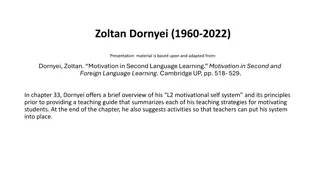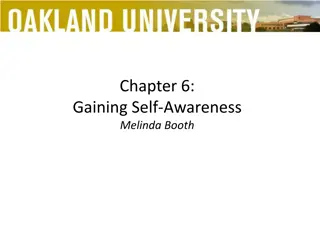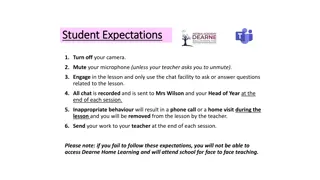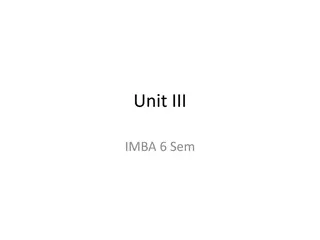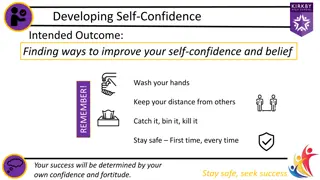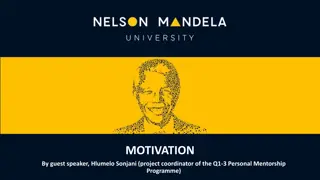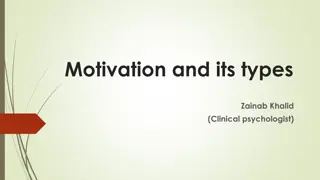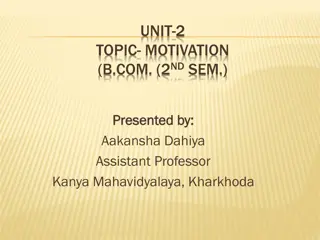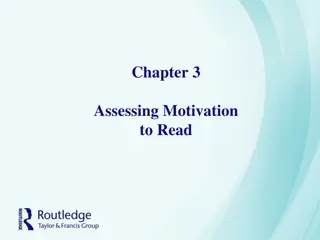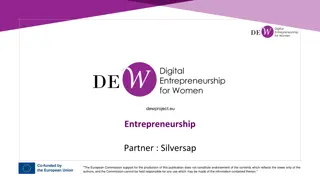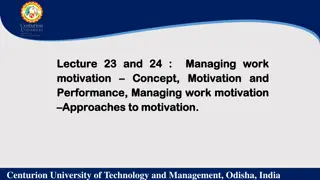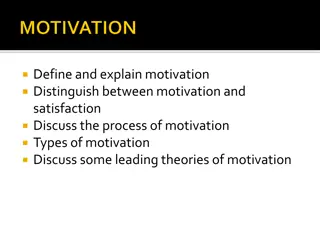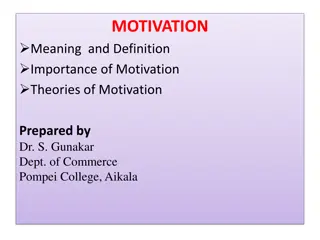Achieve Your Dreams Through Self-Motivation
Discover the power of self-motivation in achieving your goals, developing new habits, and enhancing organizational skills. Learn how self-motivation drives success, and take a self-motivation quiz to assess your drive towards accomplishing your dreams.
Download Presentation

Please find below an Image/Link to download the presentation.
The content on the website is provided AS IS for your information and personal use only. It may not be sold, licensed, or shared on other websites without obtaining consent from the author. Download presentation by click this link. If you encounter any issues during the download, it is possible that the publisher has removed the file from their server.
E N D
Presentation Transcript
How Self-Motivated Are You? #DREAMBig
LO1 to understand our own levels of motivation. LO2 to demonstrating our understanding of the power of habit. LO3 to apply new organisational skills learnt. Think, Pair & Share: What is your worst habit? Have you broken it? If so, how? How difficult was it? Share your thoughts with your partner and then share with the class.
LO1 to understand our own levels of motivation. LO2 to demonstrating our understanding of the power of habit. LO3 to apply new organisational skills learnt. Are you motivated to achieve what you really want in life? And how hard do you push yourself to get things done? What's the difference between those who never reach their goals, year after year, and those who achieve one goal after another? Often, it's their self-motivation.
LO1 to understand our own levels of motivation. LO2 to demonstrating our understanding of the power of habit. LO3 to apply new organisational skills learnt. Self-motivation is the force that keeps pushing us to go on it's our internal drive to achieve, produce, develop, and keep moving forward. When you think you're ready to quit something, or you just don't know how to start, your self-motivation is what pushes you to go on. With self-motivation, you'll learn and grow regardless of the specific situation. That's why it's such a fundamental tool for reaching your goals, achieving your dreams. How hard do you push yourself to get things done?
LO1 to understand our own levels of motivation. LO2 to demonstrating our understanding of the power of habit. Task) Complete the Self-Motivation Quiz. Click on the link or scan the QR code: LO3 to apply new organisational skills learnt. https://www.mindtools.com/pages/article/newLDR_57.ht m Scan with your iPad/Phone camera to access. When complete, read your score interpretation underneath the quiz. Think, Pair & Share: discuss your results with your partner. What factors impact your motivation and how have you overcome this in the past? Share your answers as a group.
LO1 to understand our own levels of motivation. LO2 to demonstrating our understanding of the power of habit. LO3 to apply new organisational skills learnt. Effort, motivation and habit are all intrinsically linked. If you can stick to new (and difficult) behaviours for 30 days, the research shows that this will become a habit, feeling like less of an imposition. But how does habit work?
LO1 to understand our own levels of motivation. LO2 to demonstrating our understanding of the power of habit. LO3 to apply new organisational skills learnt. Research shows that we can hack our brains with a reward system to change our habits. We can therefore create new habits to become more motivated and organised, helping us to achieve our goals. Today, we will look at: Hacking Your Brain s Reward System to Change Habits The Three R s of Habit The Energy Line The Eisenhower Matrix
Learning Objectives: LO1 to understand our own levels of motivation. LO2 to demonstrating our understanding of the power of habit. LO3 to apply new organisational skills learnt.
LO1 to understand our own levels of motivation. LO2 to demonstrating our understanding of the power of habit. LO3 to apply new organisational skills learnt. Key Vocabulary: Intrinsic - being an extremely important and basic characteristic of a person or thing. Cue a signal for someone to do something. Neuron - being an extremely important and basic characteristic of a person or thing. Matrix a rectangular array of numbers, symbols, or expressions, arranged in rows and columns
LO1 to understand our own levels of motivation. LO2 to demonstrating our understanding of the power of habit. LO3 to apply new organisational skills learnt. Hacking Your Brain s Reward System to Change Habits
How Habit Works https://www.youtube.com/watch?v= vN1aRN5bQQ0 Got a bad habit you just can t seem to break? That s because it s literally wired into your brain. Every single thought, action, and feeling changes your brain. When repeated enough times, a habit is formed. We can use this to our advantage. LO1 to understand our own levels of motivation. LO2 to demonstrating our understanding of the power of habit. LO3 to apply new organisational skills learnt.
Answers (green pen marking and stick in your books): 1) True 2) New neural pathways (habits) are formed by consciously repeating a behaviour. 3) Cue, behaviour & reward 4) Rewarding a behaviour can help create a craving and this is what makes a habit so strong. The action of concentrating the eyes directly on something. 5) You get cravings because the link between behaviour and reward becomes so strong that the neurones start firing at the thought of the behaviour. 6) When a behaviour is repeated often enough, a habit is formed. LO1 to understand our own levels of motivation. LO2 to demonstrating our understanding of the power of habit. LO3 to apply new organisational skills learnt.
We use the Three Rs to tap into the power of habit to motivate ourselves. LO1 to understand our own levels of motivation. LO2 to demonstrating our understanding of the power of habit. LO3 to apply new organisational skills learnt.
Reminder (Cue), Routine (Behaviour) & Reward - Explained Use the Three Rs to create a new habit around studying. Read through the example on the right hand side.
Task) think about a habit you would like to form and plan this out in your books. Use the template below and then share with the class. Trigger: Routine: Reward: Here is an example Bonus! What makes the most powerful type of reward and how can you tap into this information to improve your motivation? Share you findings with the class. LO1 to understand our own levels of motivation. LO2 to demonstrating our understanding of the power of habit. LO3 to apply new organisational skills learnt.
Motivation is key to Organisation. Both are key to success. LO1 to understand our own levels of motivation. LO2 to demonstrating our understanding of the power of habit. LO3 to apply new organisational skills learnt.
Often, poor organization can impact motivation. Here are some tips for staying organised. LO1 to understand our own levels of motivation. LO2 to demonstrating our understanding of the power of habit. LO3 to apply new organisational skills learnt.
The Energy Line rank your tasks by the energy they use up. LO1 to understand our own levels of motivation. LO2 to demonstrating our understanding of the power of habit. LO3 to apply new organisational skills learnt.
Task 2) on your sheet, complete The Energy Line below for everything you have to do this week including school life, work life and your personal life. Reflect upon those tasks that are high energy and justify their importance. Is their effort worth their reward? Is there anything you would remove from your list? Discuss with your partner. LO1 to understand our own levels of motivation. LO2 to demonstrating our understanding of the power of habit. LO3 to apply new organisational skills learnt.
LO1 to understand how we comprehend information through reading. LO2 to understand how we effectively engage with sources in order to comprehend information. LO3 to demonstrate use of a strategy for effective reading. The Eisenhower Matrix boost your productivity by prioritising your tasks by urgency and importance.
The Eisenhower Matrix https://www.youtube.com/watch?v= tT89OZ7TNwc A long to do list can often impact motivation. Sometimes, you just don t know where to start. Watch the video and then complete the Eisenhower Matrix for all of the tasks you need to do this week. Discussion what does it show you about your priorities? LO1 to understand our own levels of motivation. LO2 to demonstrating our understanding of the power of habit. LO3 to apply new organisational skills learnt.
LO1 to understand our own levels of motivation. LO2 to demonstrating our understanding of the power of habit. LO3 to apply new organisational skills learnt. Plenary: Task) you are asked to contribute to the Sixth Form prospectus. This will be read by the current Year 11. Write an article explaining how to study effectively. Refer to: - How the brain works and how to reduce Cognitive Load. - The importance of Interleaving and Spaced Learning. - How to engage with sources using Academic Reading strategies and Cornell Notes. Give your opinion on the most and least effective strategies that you have learnt this term.










